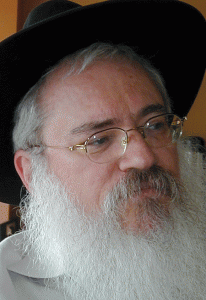By STEVEN ROSENBAUM
The new issue of Moment magazine revisits the controversy stirred up by the publication of a short article by Rabbi Manis Friedman, an esteemed member of the Chabad-Lubavitch Hasidic sect who lives in St. Paul (6-12-09 AJW).
In the “Ask the Rabbis” column in Moment’s May/June issue, Friedman responded to a question about how Jews should treat their Arab neighbors. He wrote, in part: “I don’t believe in Western morality. The only way to fight a moral war is the Jewish way: Destroy their holy sites. Kill men, women and children (and cattle).”
Writing in Moment’s July/August issue, editor Nadine Epstein explains that “Friedman’s original answer — most often taken out of the context of the forum and sans the comments of the other nine rabbis — caught fire in the media, making its way into newspapers and blogs across the country, in Israel and elsewhere. Traffic to our website nearly tripled and our IntheMoment blog drew thousands of visitors, including some who participated in the discussion.”
Epstein added, regarding the rabbi’s incendiary comments, which were repudiated locally and nationally by Chabad leaders: “What happened is not unusual. Once ideologues get hold of something, wild discourse is often the result. However, among the rest of us, and that is most of us, accurate coverage sparks genuine thinking. In a case like this, it encourages us to pay more attention to what is being said—and sometimes done—in the name of Judaism. That’s the point of a magazine like Moment.”
Some readers criticized the magazine for publishing Friedman’s brief article, but Gershom Gorenberg, who also writes about the Friedman flap in Moment’s July/August edition, asserts that the magazine acted correctly, “because journalism’s job is to tell people what’s happening in the world, not to prettify it. Friedman was one of 10 rabbis to answer Moment’s question, and the only one to take the stance he did. But he speaks for an ideological trend in the Jewish world that needs to be recognized, understood and strongly answered.”
In his column titled “The Jewish Way: Killing in God’s Name?” Gorenberg classifies Friedman’s comments as representative of the “thoroughly modern phenomenon known as fundamentalism. Fundamentalists are frightened by the openness of the modern world, by the autonomy of the individual, by modern insistence on reaching truth through reasoned debate. They want to feel certain that they are following an unambiguous religious authority.”
He continues: “The fundamentalist solution has several elements. First, insist on heteronomy, on an authority outside oneself. Second, assign that role to a person or a book that speaks for God. Third, assert that the sacred text has an obvious ‘literal’ meaning. And fourth, proudly derive from that text the willingness to believe and to do things that are scandalous in ethical terms — indeed, that defy your own basic moral instincts. That way, you can be sure you are following the outside authority. Declare, for instance, that ‘the Jewish way’ requires killing ‘men, women and children (and cattle)’ in times of war.”
In her editor’s column, Epstein also mentions that the magazine has “published Rabbi Friedman’s full statement… in the Letters section. I know from my talks with him that he feels misunderstood and would like people to read his original comments in their entirety. Moment offered him the opportunity to further explain his thoughts in this issue and he initially agreed. Due to the threats he received, however, he has decided to wait until a future issue.”
Finally, Friedman makes a comeback in the current issue of Moment, again contributing to the “Ask the Rabbis” column, this time about Judaic strictures against tattoos and body piercings.
***
Steven Rosenbaum is an editorial intern at the American Jewish World.




















